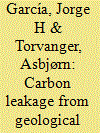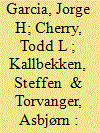| Srl | Item |
| 1 |
ID:
166307


|
|
|
|
|
| Summary/Abstract |
A number of studies show that large-scale deployment of Carbon Capture and Storage (CCS) is necessary to limit the increase in global average temperature to less than 2 °C by 2100. However, some experts and citizens worry about the integrity of carbon dioxide storage sites due to the possibility of future leakage. We introduce a two-period model where two emission mitigation technologies are available to society in the first period: CCS, with a risk of carbon dioxide leakage in the second period, and a riskless mitigation alternative, such as renewable energy. We first solve the model assuming that society does not know what the future rate of leakage will be. We then solve the model assuming that society will eventually learn the actual leakage rate. We find that, in a trading market in period one, reductions of CO2 emissions through CCS should generate a less than proportional amount of CO2 allowances. Estimates from simulations, using a coarse range of parameters, indicate that the discount factor of CCS allowances lies in the range (0.72, 1). Site-specific data is required to determine site-specific risks of leakage and discount factors.
|
|
|
|
|
|
|
|
|
|
|
|
|
|
|
|
| 2 |
ID:
149941


|
|
|
|
|
| Summary/Abstract |
Wind power development projects often include compensation for the affected communities, but little is known about the efficacy of the alternative compensation mechanisms. This study addresses this question by examining the relative potential of private and public compensation. We conduct a Choice Experiment (CE) that investigates household preferences of compensation for the local siting of a hypothetical wind park. Households chose among different alternatives, where each alternative was characterized by three varying attributes: the number of turbines, the level of private compensation, and the level of public compensation. Results indicate the wind park imposes welfare losses to local residents and non-local recreational users, with about 35% of these losses corresponding to non-use values. Findings show that households prefer public compensation to private compensation, with household’s willingness to accept being lower with public compensation than private compensation. This finding suggests that estimates of local resistance to wind development depends on the compensation mechanism.
|
|
|
|
|
|
|
|
|
|
|
|
|
|
|
|